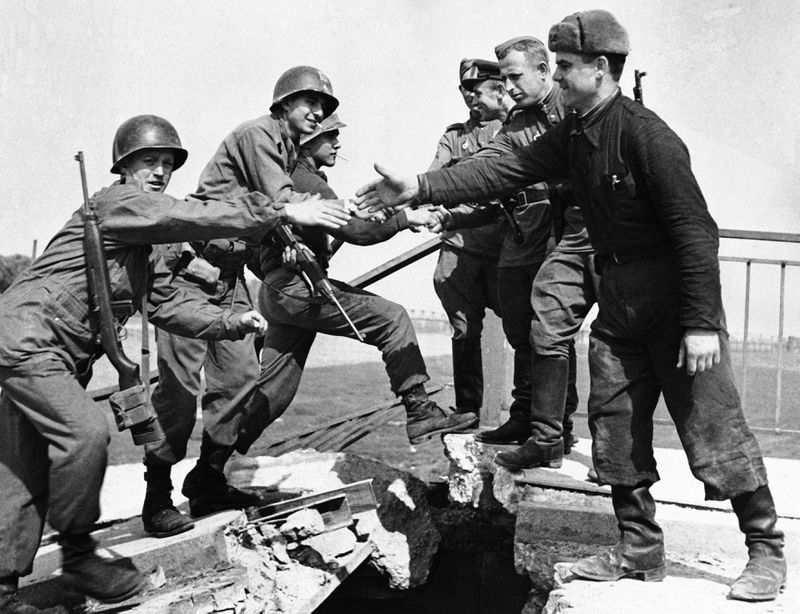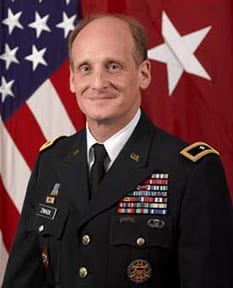
 The crushing defeat of Nazi Germany 75 years ago was memorialized on April 25, 1945, by a gesture, a handshake between battle-hardened American and Soviet soldiers linking-up as wartime allies in the closing days of World War II. This special embrace as comrades-in-arms along the Elbe River at Torgau culminated a fleeting bond between soldiers sharing in an indescribably costly but just war against the most hideous existential threat the modern world had ever known. Shortly thereafter, this hard-earned soldiers’ bond was abandoned and lost in the Cold War; an unfortunate state-of-being that in fits and starts has carried on to this day.
The crushing defeat of Nazi Germany 75 years ago was memorialized on April 25, 1945, by a gesture, a handshake between battle-hardened American and Soviet soldiers linking-up as wartime allies in the closing days of World War II. This special embrace as comrades-in-arms along the Elbe River at Torgau culminated a fleeting bond between soldiers sharing in an indescribably costly but just war against the most hideous existential threat the modern world had ever known. Shortly thereafter, this hard-earned soldiers’ bond was abandoned and lost in the Cold War; an unfortunate state-of-being that in fits and starts has carried on to this day.
 Peter Zwack, a retired brigadier general, is a Wilson Center Global Fellow within the Kennan Institute. He had a 34-year U.S. Army career, culminating as the U.S. senior defense attache to the Russian Federation.
Peter Zwack, a retired brigadier general, is a Wilson Center Global Fellow within the Kennan Institute. He had a 34-year U.S. Army career, culminating as the U.S. senior defense attache to the Russian Federation.
The crushing defeat of Nazi Germany 75 years ago was memorialized on April 25, 1945, by a gesture, a handshake between battle-hardened American and Soviet soldiers linking-up as wartime allies in the closing days of World War II. This special embrace as comrades-in-arms along the Elbe River at Torgau culminated a fleeting bond between soldiers sharing in an indescribably costly but just war against the most hideous existential threat the modern world had ever known. Shortly thereafter, this hard-earned soldiers’ bond was abandoned and lost in the Cold War; an unfortunate state-of-being that in fits and starts has carried on to this day.
This year’s planned remembrance of that heady 1945 moment has been engulfed by the ongoing COVID-19 pandemic. Modest non-governmental commemorations, conferences and a reenactment scheduled for April 24-25 in Germany, Russia and at Arlington cemetery were planned then understandably canceled as travel bans were set in place in February and March of this year. U.S., Russian and former Soviet citizens including several ancient veterans, and retired Cold War-era generals from both sides, were to have publicly met. There will be a single virtual conference in their stead.
Therefore we have lost much of a seriously needed opportunity to spotlight for our respective publics a positive historic moment between Moscow and Washington at a time when current relations remain dismal and dangerous. It also was one of the final WWII anniversary moments left to honor our few remaining veterans — including those of our allies and foes — that served during that grimly epic time. This is especially important for our younger generation, who’ve grown-up only knowing tense U.S.-Russian relations and may have little or no awareness of this better historic moment.
Finding credible venues upon which to positively build are urgently needed to smooth the sharp and dangerous edges that continue to dog U.S. and Russian relations. Despite our opposing worldviews, there is a pressing need to rebuild educational and confidence-building venues between our citizens at every level. Special focus, urgently needed now, must be to deepen credible "eyes-wide-open” contact between our nuclear-tipped militaries across different operational and strategic levels. Despite improved direct Washington to Moscow links, the limited regional leader-level contact between our active militaries, both worldwide powers that stretch from the Atlantic to Pacific, is particularly problematic.
Some will surely say any enhanced U.S.-Russia contact, even if non-governmental commemorative events such as the Elbe link-up, would cast the United States and the West as appeasing Moscow during this geopolitically contentious period and imply acquiescence to Russia’s malign actions. I reject this perspective. Publicly commemorating positive events would not infer any easing of sanctions on Russia or mean reducing support for our NATO allies and partner nations such as Ukraine and Georgia.
There will be almost no World War II veterans left from any side for an 80th commemoration in 2025. Those few remaining are mostly infirm and sheltering from the lethal coronavirus. Their legacy and the memory of their passed peers should be publicly highlighted and remembered for all ages, especially today. Modest success would be public statements by our senior political and military leaders in conjunction with veterans and civic organizations commemorating the April 25 Elbe link-up and WWII sacrifices highlighting those remaining veterans with call-outs, media interviews and documentaries.
The U.S., Russia and the other countries of the former Soviet Union whose soldiers shook hands together on that fateful, promising day 75 years ago, must not abandon its memory and that of the overall end of WWII during these anxious COVID-19 times. It’s also important to assure our youth and future generations, who will surely grapple with the societal changes stemming from a soon-to-be post COVID-19 world order, that we did all we could to ease the world back from today’s dangerous state-of-affairs that remain a continuing existential threat to us all.



_jpg/250px-ElbeDay1945_(NARA_ww2-121).jpg)





